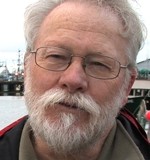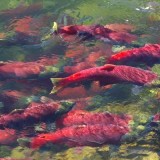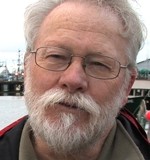To date the Harper government has shown little regard for the protection of the environment and over the past few years has supervised the almost total elimination of enforcement of the habitat protection and the pollution provisions of the Canada Fisheries Act (Sections 35 and 36 respectively). During the Cohen Inquiry in 2011 data was presented to show that pollution and habitat violation investigations have been greatly reduced and convictions of violations in BC and indeed throughout Canada is now almost non-existent (see attachment).
The Fisheries Act of Canada was put in place in 1868 and is one of the oldest and most tested pieces of environmental legislation in the world. In 1975 many people worked hard to get a proper section added to the Act to protect fish habitat in Canada. Section 35 (habitat protection) was passed by Parliament in 1976 and has been extensively used across Canada over the past 36 years. In B.C., the Federal and BC governments largely quit enforcing the pollution and habitat sections of the Act in favor of allowing industry to self govern their own environmental project’s ‘needs’ and monitor their own self compliance. This has proven to be a disaster wherever it has been attempted elsewhere in the World.
I have just been leaked a confidential copy of proposed changes to the habitat provisions of the Fisheries Act as directed by the political levels within the Harper Government. The government is totally re-writing the habitat protection provisions of Section 35(1) so as to remove habitat protection out of the Fisheries Act. This is a serious situation and will put Canada back to where we were in the pre 1976 period where Canada had no laws to protect fish habitat and no way to monitor the great industrial expansion that occurred in Canada with the consequential loss of major fish habitat all across Canada.
Fish habitat includes the lakes, rivers and oceans and their water flows, life processes, the banks and the riparian vegetation along a water way, marshes, gravel beds and the diversity of habitat that allow a rich and diverse population of life to live in our waterways that supports a large economic, cultural and recreational fishery. Also this habitat produces healthy and robust populations of fish that are essential to the feeding and maintaining the health of the aquatic and terrestrial ecosystems e.g. the bears, eagles, otters, grebes, herons, etc.
Section 35(1) of the Fisheries Act now states:
35(1) No person shall carry on any work or undertaking that results in the harmful alteration, disruption or destruction of fish habitat.
(2) No person contravenes subsection (1) by causing the alteration, disruption or destruction of fish habitat by an means or under any conditions authorized by the Minister or under the regulations made by the Governor in Counsel under this Act
The proposed new subsection 35(1) of the Fisheries Act is as follows:
35(1) No person shall carry on any work, undertaking or activity, other than fishing, that results in an adverse effect on a fish of economic, cultural or ecological value.
(2) No person contravenes subsection (1) if
(a) the adverse effect is authorized by the Minister and is produced in accordance with the conditions established by the Minister;
(b) the adverse effect is authorized by a person prescribed by the regulations and is produced in accordance with the conditions prescribed by the regulations;
(c) the work, undertaking or activity is carried on in accordance with the conditions set out in the regulations or with any other authorization issued under this Act;
(d) the work, undertaking or activity is carried on in, on, over, under, through or across any Canadian fisheries waters, and
(i) the work, undertaking or activity falls within a class of works, undertakings or activities, or the Canadian fisheries waters fall within a class of Canadian fisheries waters, established by regulation, and
(ii) the work, undertaking or activity is carried on in accordance with the conditions prescribed by the regulations.
The existing effective and essential piece of legislation is to be changed to apparently just protect fish – something that the Act already does. The lack of mention of ‘habitat’ in the proposed draft law and the number of subjective and ambiguous words inserted into this major amendment will make any enforcement of this new law very difficult. For instance what is a fish of economic, cultural or ecological value? If is has no economic value, can it now be needlessly destroyed? This newly drafted provision is not intended to protect fish habitat in any manner whatsoever. To support the habitat provisions in the Act, in 1986 DFO developed the National Habitat Policy with it’s central theme of ‘no net loss’ and it was once heralded as one of Canada’s first policies promoting sustainable development. Will that now also be withdrawn?
Also the above drafted section is enabling the making of regulations and, as with CEAA, the government may pass many regulations that restrict the intent of that section of the Act. That is double jeopardy. First the Canadian government amends the legislation to eliminate the protection of fish habitat and then it may undermine that new questionable fish protection legislation by allowing the passing of regulations that will create loopholes in what is left in the Act.
DFO used to hand out pencils and pens with the slogan embossed on their sides: No Habitat – No Fish. The Prime Minster and the Minister of Fisheries and Oceans must realize that the Government has not replaced nature and has not changed the ecological and natural laws that create habitat and maintain ecological functioning in our essential life supporting aquatic ecosystems. They cannot replace living forms of life and their habitats and when it’s gone, it’s gone. Why at this key time in our history of ongoing industrial development pressures on our rivers, lakes and oceans, do we turn away from responsible aquatic habitat protection responsibilities? Where is the ethic and moral responsibility for our children and future generations and those that cannot be heard or cannot vote – our fish and wildlife resources?
This proposed move by the Harper government is a travesty for our fishery resources and the health of the entire ecosystem and it ignores the needs of our future generations. It is little less than another attack on the biological systems that allow life to exist on this planet. To make matters worse, the political level has decided to not consult with DFO staff or the public on these proposed changes. The Harper government will attempt to sneak this neutering of the Fisheries Act through Parliament within the next two weeks by tacking it on to the end of the up coming Budget Omnibus Bill.
This is disgraceful and the movers of this legislative change are urged to reconsider their planned reckless and irresponsible actions. All sport fish groups, fishermen, First Nations, ENGOs and the public must say enough is enough and oppose what Mr. Harper is planning to do.
Biography of Otto E. Langer (BSc(Zool) MSc):
Worked for DFO and DOE for 32 years in habitat and water quality protection issues. Helped organize BC Assoc. of Prof. Biologists and was President of the group. Qualified as an expert witness on over 100 pollution and habitat destruction cases in Canada from Newfoundland to Vancouver Island. Published and directed many studies relating to the protection status of BC habitats. Author of the red, yellow and green habitat color zoning system that is used to protect the Fraser River Estuary. Promoted the inclusion of habitat protection provisions into the Fisheries Act in 1975.
Awarded the BC Government Silver Metal for urban stream riparian protection in 2000; BCWF BC Conservationist of the Year 2009; Co-recipient of BC Best Regional Book Prize 2005 – Stain Upon the Sea – a book dedicated to exposing the salmon farm industry in BC. Awarded the CWF Roland Michener Canadian Conservationist of the Year Award for 2010. Left government in 2001 and joined the David Suzuki Foundation (2001 to 2005) and formed their Marine Conservation Program. Has been retired for past 7 years and does volunteer work for many conservation causes including VAPOR (no jet fuel tankers in the Fraser River) , Fraser River Gravel Stewardship Committee (Chilliwack), oil and oil sands issues, London UK based MSC (2001-2010), BC Marine Conservation Caucus and had legal standing at the Cohen Inquiry on declining Fraser River sockeye stocks.








